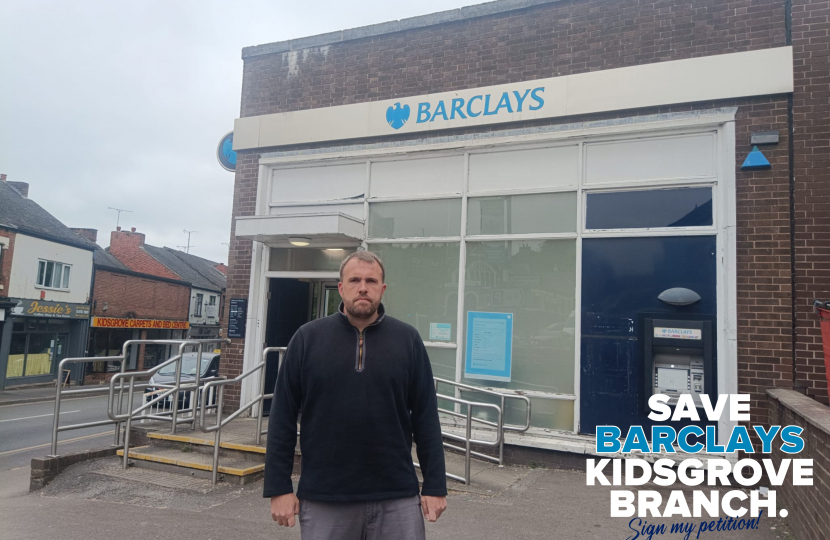
Following Barclays’ controversial decision to close the last remaining bank in Kidsgrove on 11th August, Jonathan Gullis MP raised the issue of bank closures in his constituency in a Westminster Hall debate.
With society becoming increasingly digitalised, there have been an unprecedented number of bank closures in the UK in the past decade. Between June 2015 and January 2023, there was an astonishing 5391 bank closures across the country – totalling 54 per month. And already this year 114 HSBC; 95 Barclays; 52 Nat West; and 23 Lloyds branches have closed leaving gaping holes in local communities. Mr Gullis argued that this is clear for his constituents with Which? pointing out that in Stoke-on-Trent North, Kidsgrove and Talke that 86% of branches have closed since 2015.
Barclays point out in their argument for closing their branch that “the way people bank is unrecognisable from fifty years ago” and that they should therefore look to adapt and change. However, Mr Gullis stated that it is of paramount importance that “we do not let digitalisation exclude people in our community from banking services”.
A lack of access to in-person bank branches has a disproportionate impact on the most vulnerable people in society, including the disabled and elderly. Around 40 per cent of over 65s – or over 4 million people – do not manage their money online. Some of Jonathan’s constituents have argued that online banking is “confusing and difficult to hear”. Barclays’ announcement comes after a recent survey by Accenture that found that 44 per cent of over 55s would rather visit their branch, and crucially showed in-person banking was also popular amongst over 20 per cent of younger people.
Constituents have also raised that reservations about the closure as they feel it leaves them “at greater risk of getting scammed”. Mr Gullis argued that he feared the precedent set by the bank’s closure will threaten his constituents’ financial security. Furthermore, Mr Gullis made clear that he is concerned that Barclays’ closure may “drive people away” from Kidsgrove. The Covid-19 pandemic has exacerbated the decline in British high streets, with over 10,000 shops, 6,000 pubs and 7,500 pubs closing in the last ten years.
Mr Gullis argues that by closing bank branches like Barclays in Kidsgrove, people will be less likely to shop and go out to eat or drink in the town. Given that Kidsgrove has recently had a “once in a generation investment” through the Town Deal funding, Mr Gullis argues that closing the bank branch could undermine the huge progress that has been made since 2019.
Mr Gullis concluded by pointing out that Barclays will introduce specific targeted support for their most vulnerable and elderly customers. This includes offering Tea and Teach sessions to help improve their digital skills alongside having a team in Kidsgrove Sports Centre offering face-to-face support on Mondays, Tuesdays and Fridays from 14th August.
In response to Mr Gullis, the Economic Secretary to The Treasury, Andrew Griffith, said that:
“The Hon. Member’s petition was incredible” and it is vital that “we remain vigilant that banks uphold their responsibilities under the FCA” and that it is “right” that the debate was secured”.
Commenting, Jonathan Gullis MP said that:
“I was pleased to be able to raise the critical issue of bank closures in Stoke-on-Trent North, Kidsgrove and Talke. With 86 per cent of banks in my constituency closing since 2015, not only does Barclays’ announcement leave the great town of Kidsgrove without a bank but it means there now remains only one bank in the whole constituency.
Given that the evidence clearly demonstrates that bank closures have a disproportionate impact on the most vulnerable, I hope that through my petition and campaign Barclays will realise they are excluding people from their own money. Alongside the impact this closure may have on footfall in the local community of Kidsgrove, I hope that my debate in parliament will make clear that their decision will have far-reaching consequences.”

